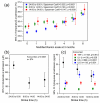Influence of Temperature Chronobiology on Stroke Outcome
- PMID: 36835156
- PMCID: PMC9967262
- DOI: 10.3390/ijms24043746
Influence of Temperature Chronobiology on Stroke Outcome
Abstract
The circadian system regulates numerous physiological variables, including body temperature. Additionally, a circadian patter has been described in stroke onset. Considering this, we hypothesised that the chronobiology of temperature may have an impact on stroke onset and functional outcomes. We also studied the variation of blood biomarkers according to stroke onset time. This is a retrospective observational study. Of the patients included, 2763 had a stroke between midnight and 8:00 h; 1571 between 8:00-14:00 h; and 655 between 14:00 h and midnight. Axillary temperature was measured at admission. At this time, blood samples were collected for biomarker analysis (TNF-α, IL-1β, IL-6, IL-10, and glutamate). Temperature was higher in patients admitted from 8:00 h to midnight (p < 0.0001). However, the percentage of poor outcome at 3 months was highest in patients from midnight to 8:00 h (57.7%, p < 0.001). The association between temperature and mortality was highest during night time (OR: 2.79; CI 95%: 2.36-3.28; p < 0.001). These patients exhibited high glutamate (220.2 ± 140.2 µM), IL-6 (32.8 ± 14.3 pg/mL) and low IL-10 (9.7 ± 14.3 pg/mL) levels. Therefore, temperature chronobiology could have a significant impact on stroke onset and functional outcome. Superficial body hyperthermia during sleep seems to be more dangerous than during wakefulness. Further studies will be necessary to confirm our data.
Keywords: chronobiology; circadian rhythm; functional outcome; stroke; temperature.
Conflict of interest statement
The authors declare no conflict of interest.
Figures





Similar articles
-
Hyperthermia is a surrogate marker of inflammation-mediated cause of brain damage in acute ischaemic stroke.J Intern Med. 2006 Oct;260(4):343-9. doi: 10.1111/j.1365-2796.2006.01694.x. J Intern Med. 2006. PMID: 16961671
-
Night work effects on salivary cytokines TNF, IL-1β and IL-6.Chronobiol Int. 2019 Jan;36(1):11-26. doi: 10.1080/07420528.2018.1515771. Epub 2018 Sep 19. Chronobiol Int. 2019. PMID: 30230913
-
Abnormal blood pressure circadian rhythm in acute ischaemic stroke: are lacunar strokes really different?Int J Stroke. 2009 Aug;4(4):257-61. doi: 10.1111/j.1747-4949.2009.00314.x. Int J Stroke. 2009. PMID: 19689751
-
The circadian rhythm of core temperature: origin and some implications for exercise performance.Chronobiol Int. 2005;22(2):207-25. doi: 10.1081/cbi-200053477. Chronobiol Int. 2005. PMID: 16021839 Review.
-
[Circadian rhythms in body temperature and sleep].Nihon Rinsho. 2013 Dec;71(12):2076-81. Nihon Rinsho. 2013. PMID: 24437258 Review. Japanese.
Cited by
-
Sleep Following a Stroke: Multimodal Evaluation of Sleep Health and Disruptions and Impact on Recovery During Acute Inpatient Rehabilitation.Neurorehabil Neural Repair. 2025 Jul;39(7):529-541. doi: 10.1177/15459683251335332. Epub 2025 May 6. Neurorehabil Neural Repair. 2025. PMID: 40326398 Free PMC article. Clinical Trial.
-
Impact of fever on the outcome non-anoxic acute brain injury patients: a systematic review and meta-analysis.Crit Care. 2024 Nov 13;28(1):367. doi: 10.1186/s13054-024-05132-6. Crit Care. 2024. PMID: 39538310 Free PMC article.
References
-
- Fagiani F., Di Marino D., Romagnoli A., Travelli C., Voltan D., Di Cesare Mannelli L., Racchi M., Govoni S., Lanni C. Molecular Regulations of Circadian Rhythm and Implications for Physiology and Diseases. Signal Transduct. Target. Ther. 2022;7:41. doi: 10.1038/s41392-022-00899-y. - DOI - PMC - PubMed
Publication types
MeSH terms
Substances
Grants and funding
- SAF2017-84267-R), PDC2021-121455-I00/Spanish Ministry of Science and Innovation
- IN607A2022-03/Xunta de Galicia (Consellería de Educación)
- (PI17/00540, PI17/01103), ISCIII/PI21/01256//Instituto de Salud Carlos III (ISCIII) Co-financed by the European Union,
- RD16/0019/0001/Spanish Research Network on Cerebrovascular Diseases RETICS-INVICTUS PLUS
- D21/0006/0003/RICORS-ICTUS (Cereborvascular diseases)
LinkOut - more resources
Full Text Sources
Medical

